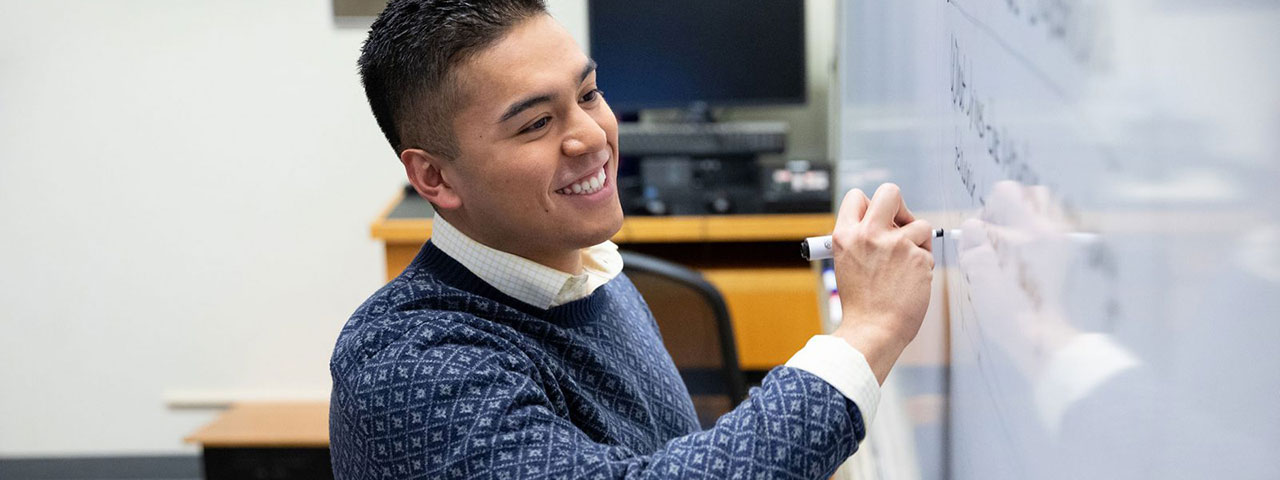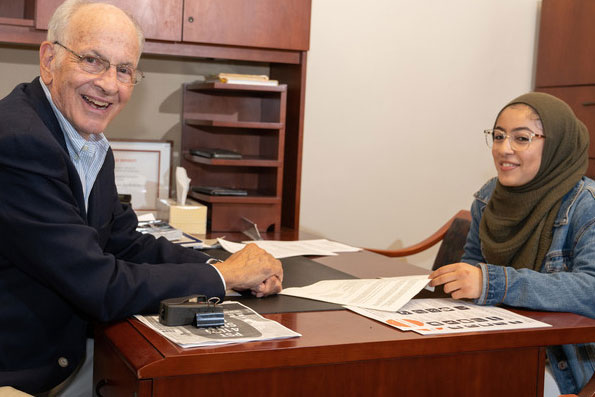Learn By Doing.
Policy Studies Major and Minor

Core Requirements (21 credits)
Seven required courses (21 credits) ground students in the fundamentals of policy creation and analysis, including quantitative methods, economics and critical issues in public affairs, as well as 90 hours of applied work in the community. Core courses are drawn from the Departments of Policy Studies (PST 101, 315 and 410); Economics (ECN 101); and Public Administration and International Affairs (PAI 305); as well as from Maxwell's signature team-taught "Max Courses" (MAX 123 and 201).
Electives (9 credits)
Students select three advanced courses (300-level or higher) and fieldwork through Maxwell's highly regarded program in public administration and international affairs as well as from selected departments in the rest of Arts and Sciences or across the University including Newhouse, Whitman, the iSchool, VPA and the College of Law. At least one elective must be a PST or PAI course.
Practicum in Public Policy (PST 410)
A signature component of the policy studies program, students develop skills and gain knowledge about organizations that influence and implement public policy through a required practicum in which students are placed in community agencies for about 90 hours of work or work in applied research projects conducted by faculty.
Required Courses
In addition to completing the Practicum in Public Policy, students in the major must complete six courses in the fundamentals of policy creation and analysis.
An Introduction to the Analysis of Public Policy (PST 101)
Methods of Public Policy Analysis (PST 315)
Develop competencies in the application of social science methods to public policy problems.
Introductory Microeconomics (ECN 101)
Develop an introductory understanding of microeconomics, including consumer demand, theory of production, markets and prices, social welfare, and related topics.
Critical Issues for the United States (MAX 123)
Explore perspectives of the meaning of the American dream, its past and its future, through the lens of social science disciplines, taught by teams of Maxwell's renowned faculty.
Quantitative Methods for the Social Sciences (MAX 201)
Develop skills necessary to analyze data and evaluate research including research design, sampling design, descriptive and inferential statistics, data sources for social science, constructing data sets, reading and constructing tables and charts.
Policy Implementation (PAI 305)
Learn how public policy is put into action, with a focus on developing knowledge and skills essential for addressing some of society’s most complex problems.
Electives (Choose 3)
Students tailor the policy studies program to their interests by selecting from a wide range of topical and advanced skills building courses. Many courses can be double-counted toward other majors, minors and (by application) advanced degrees. A sample of course options is provided below.
Maxwell and Arts & Sciences Electives
- Any PST or PAI course numbered 300 and above
- ECN 304: Economics of Social Issues
- PSC 302: Environmental Politics and Policy
- PSC 308: The Politics of U.S. Public Policy
- WRT 307: Advanced Writing Studio: Professional Writing
Electives Offered Across Syracuse University
- PHP 318: Alcohol, Other Drugs, Sex and Gambling: Dynamics of Addiction
- PHP 402: Implementing and Evaluating Health Programs
- IST 343: Data in Society
- IST 387: Introduction to Applied Data Science
- SWK 314: Social Welfare Policy and Services I
- SWK 315: Social Welfare Policy and Services II
Considering a Policy Studies Minor?
The minor program consists of 18 credits, 12 of which must be from upper level courses. The minor is awarded by petition only after all of the courses have been completed. Students who are considering the minor are encouraged to schedule time with an advisor in the program and to explore whether the major is a better fit for their academic goals.

Study Abroad or in Washington, D.C.

NYS Assembly Intern Program
Earn a full semester's credit while working and learning in the New York State legislature in Albany. From January to May, students work for a legislator and take courses on state politics, taught by faculty-in-residence. Interns receive a $6,600 stipend and 15 credits, up to 9 of which may apply to related Maxwell majors. Speak with your advisor for more details.
Following her internship with the NYS Assembly, Vanessa Salman ’17 B.A. (PSc) accepted a job offer as staff training associate and now helps supervise current interns. She says, “Maxwell courses develop incredible critical thinking skills that really set me apart
in my internship and in my work now.”
I am Maxwell
Ashia Aubourg dreamed of being a chef until an internship in high school revealed to her the deep chasm of food inequity. “Having the opportunity to tell a narrative and center underrepresented communities or topics is a privilege I do not take lightly,” says Aubourg, who is also contributor for Food & Wine and Cuisine Noir magazine.
Ashia Aubourg Policy Studies ’18 B.A.
Food Writer, SELF magazine
